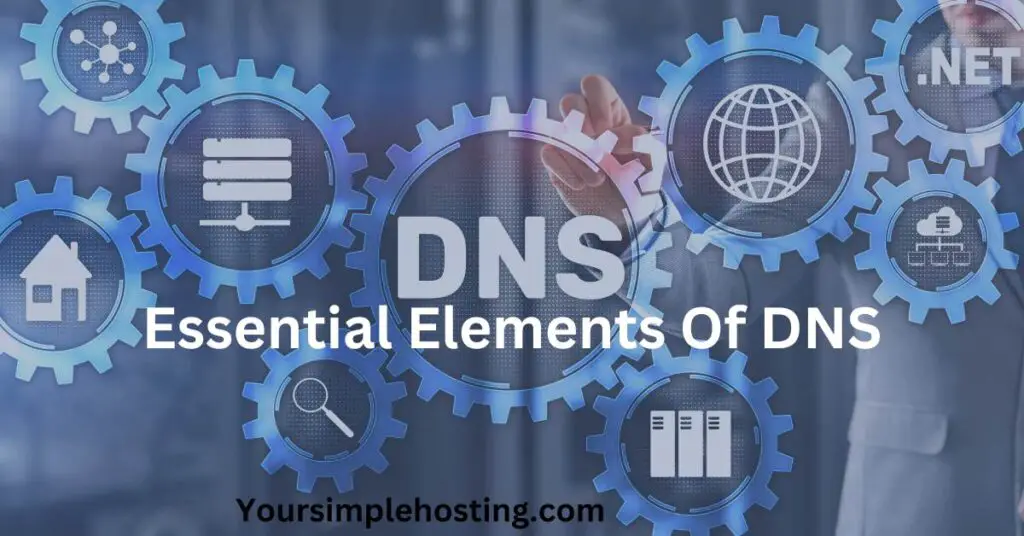If you’re new to the world of blogging, website creation, and web hosting, there will probably be a lot of technical terms you come across that you don’t understand.
To be honest with you, that’s expected.
Even professional website designers, bloggers, and website owners come across terms they don’t understand.
One example of this is the domain name system, otherwise known as DNS.
Despite being critical for web hosting, most people don’t know what DNS is, how it works, or why we need it.
DNS Hosting, or Domain Name System Hosting, refers to the service of managing and maintaining Domain Name System (DNS) records for a domain name. DNS is a fundamental system on the internet that translates human-readable domain names (like www.example.com) into IP addresses (such as 192.0.2.1) that computers use to identify each other on the network.
If you don’t, you’ve come to the right place. In today’s post, I will tell you exactly what DNS hosting is, why it’s important, and how it works.
I’ll also show you some of the advantages and potential issues.
Let’s get started, shall we?

Table of Contents
What Is The Domain Name System (DNS) Hosting?
Let’s get straight into it by telling you what a DNS is.
Simply put, a DNS is like the internet’s phone book. It tracks all the domain names on the internet and the associated numbers (IP addresses).
For those unsure, a domain name is the part of your website address that follows www. The long number associated with each website is the IP address.
The main function of DNS is to make it easier for us to find websites. This network component translates domain names into machine-readable IP addresses.
DNS hosting refers to the network service that provides DNS servers. It is important to remember that web hosts and DNS hosts aren’t the same thing.
Why Is DNS Hosting Important?
DNS is incredibly important because, without it, your website becomes unreadable.
A DNS host takes our website IP address and translates it into a website name we can easily remember.
For example, without DNS, we would have to type something like 173.12.324.1 whenever we wanted to find a particular website.
Thanks to DNS, you can just type the easier-to-remember website name into search boxes instead.
The DNS system will then take you to the right website.
By making your website easier to find, you have a better chance of increasing your audience. Of course, DNS hosting also makes it much easier for us to use the internet.
How Does DNS Hosting Work?
So, how does DNS hosting work? Well, the technology behind DNS hosting is actually quite straightforward.
It takes the domain name we know and determines its IP address from a huge database.
Working in the background, DNS can then identify the website we’re trying to find from its domain name before pushing us in the right direction by connecting the domain name with the correct IP address.
It works much like a phone book. It essentially manages the mapping between names and numbers by translating requests from names in IP addresses instead of names into phone numbers.
These requests are called queries.
How Does DNS Affect Web Hosting?
DNS hosting plays a huge role in your web hosting because people are unlikely to visit your website without it.
The only way people would be able to visit your website without DNS is if they remember your IP address.
DNS mainly affects your website by telling visitors’ computer systems where it is.
If a visitor hasn’t been to a website before, the browser sends a message to the DNS hosting platform nearest to them.
The DNS platform will then take several steps to determine where the website is hosted. It then lets the computer know.
From this, the computer requests the website hosting server and starts communicating normally.
A local record is also saved on the computer. Then, in the future, the computer doesn’t have to check the DNS servers. Instead, it will just load the page.

Essential Elements Of DNS
Here are some of the essential DNS elements you need to be aware of:
Domain Name Registration
It doesn’t matter who you use as a web host; every domain name on the internet must be registered with a domain name registrar.
This is a company that keeps track of who owns which domains.
Web Servers
The internet uses web servers to store all your website’s information. This includes images, videos, and text that make up most of your website.
Name Servers
DNS servers are run by name servers. All of your website’s DNS data is kept on these servers. Name servers are managed and hosted by a DNS host.
Website Hosting
DNS servers work alongside web hosting providers to provide you with online access to web servers.
This saves you money, time, and hassle because you don’t need to manage these servers by yourself.
Advantages Of DNS Hosting
First, I’d like to share some of the advantages and potential issues of DNS hosting. I’ll start with the advantages!
- Generally, DNS is one of the only systems in the world that can help us browse the internet.
- A DNS hosting company does all the hard work for us.
- No need to memorize IP addresses.
- Users find it easier to find our websites.
- DNS servers offer important security for our network connections.
- DNS servers offer fast connection.
Potential Issues
Here are some of the potential issues associated with DNS hosting:
- If DNS servers go down, nobody can access your website.
- Some DNSs offer slow response times.
- If you move your site and don’t update your DNS through a nameserver, DNS will continue to direct traffic to the old location.
Frequently Asked Questions
Do Web Hosting Companies Offer DNS Hosting?
While web hosting and DNS hosting aren’t the same things, most web hosting providers include some form of DNS hosting services in their plans. Examples of this include Bluehost and GoDaddy.
Is DNS Hosting Free?
More often than not, yes, DNS hosting is free. You’ll find that most domain registrars include DNS services free of charge.
Final Thoughts
Now you’ve reviewed all the information in this post, and you should know exactly what DNS hosting is. You should also understand how DNS works and why it’s important.
Now you know, you can appreciate all the work your DNS host does in terms of making your website easy to find.
You can also thank them for how much easier they make it for you to search the Internet.

Leave a Reply